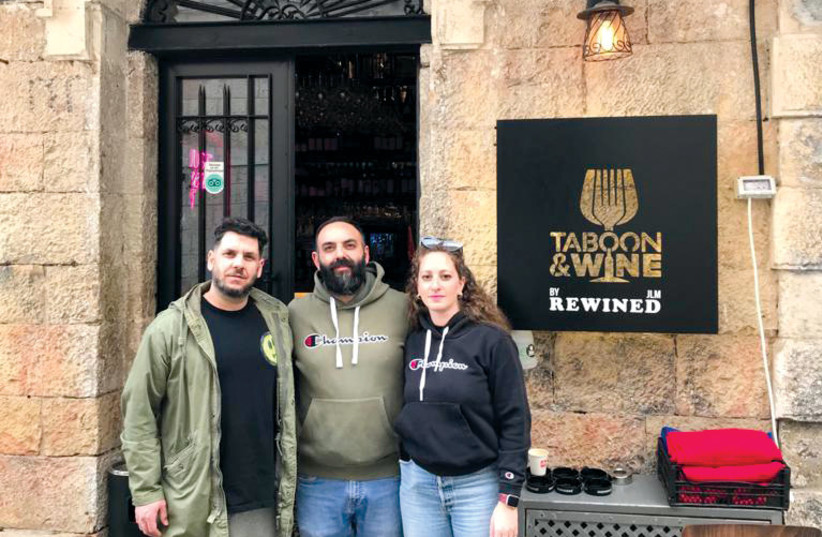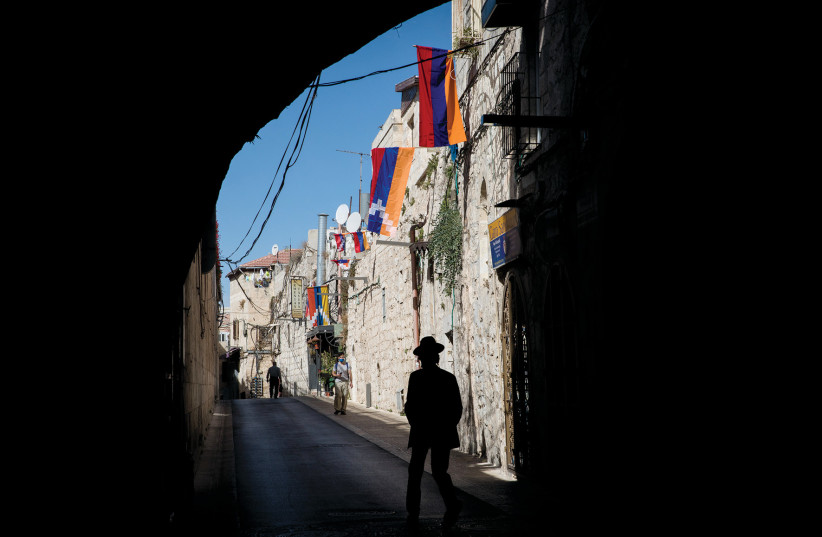Harassments that include spitting, cursing and pushing Armenian priests in the alleys of the Old City have already become routine. Police have so far failed to provide even a minimal response.
Miran Krikorian never thought his restaurant Taboon & Wine, located at the New Gate leading into the Old City’s Christian Quarter, would be targeted by a bunch of young Jewish hooligans. But that is exactly what happened on the eve of January 30 when his employees sent him an urgent message describing the attack and destruction caused by a group of extremist Jewish boys while customers, some of them Jewish, were sitting there.
“I was surprised that the Christian Quarter near the New Gate [about 50 meters from Safra Square], favored by the mayor as a favorite and safe place to hang out on weekends, when almost all the entertainment places in the west of the city are closed on Shabbat, turned out to be a not very quiet and safe place!” Krikorian said ironically.
“I was surprised that the Christian Quarter near the New Gate [about 50 meters from Safra Square], favored by the mayor as a favorite and safe place to hang out on weekends, when almost all the entertainment places in the west of the city are closed on Shabbat, turned out to be a not very quiet and safe place!”Miran Kirkorian
Attacks on Christians in Jerusalem by Jews are on the rise
Christians in east Jerusalem have complained of increasing attacks by Jewish extremists on their sites in recent months. Earlier this month, Jewish attackers desecrated a Christian cemetery on Mount Zion, where Christians believe Jesus’s Last Supper took place.’
Harassments that include spitting, cursing and pushing Armenian priests in the alleys of the Old City have already become routine. Young boys with an ultra-Orthodox appearance come in groups to identify the priests and harass and humiliate them. This has been an almost daily occurrence for several years, but the police have so far failed to provide even a minimal response. The Armenian residents claim that they do not receive an adequate response; there is no follow-up to the complaints submitted to the police; there are no updates; and, most importantly, there is no sign of this harassment abating. The opposite is the sad reality.
Another case of harassment happened on January 31st, when two Jewish extremists tried to obstruct traffic on the street where the Armenian Patriarchate is located in the Old City.

Father Aghan Gogchian, chancellor of the Armenian Patriarchate of Jerusalem, told the foreign press that two Israelis also struck a car in which a group of young Armenians were traveling on their way home from work. Gogchian added in a Facebook post that the young Armenians were verbally attacked by the two when they tried to ask why their car was hit.
“You don’t have a neighborhood here. This is our country. Get out of our country.”One of the Israeli extremists
“You don’t have a neighborhood here. This is our country. Get out of our country,” one of the Israeli extremists shouted at the chancellor. The two young Armenians filed a complaint with the Israeli Police, who arrested and interrogated the two extremists. One of them was released, while the other is still in custody.
Another group of Israelis also attempted to climb onto the roof of the Armenian Patriarchate to remove the flags of the Patriarchate and the Republic of Armenia but were prevented from doing so by young Armenians standing outside the monastery.
THE LIST is very long, causing growing concern among the Armenian public, mainly because of the authorities’ failure to deal with the situation. “We no longer want to file complaints with the police every time there is an attack because it’s clear to us that they won’t do anything about it anyway,” Krikorian explains.
Krikorian points out that while he and his wife and son, who run the restaurant, received many expressions of support and even practical help in cleaning and tidying up the restaurant after the attack, “this stands in stark contrast to the inaction of the police. People who don’t even live in Jerusalem told us that they decided to come to show support. People who came to help told me they were ashamed of these actions. It’s very touching. It helps us feel that we’re not alone. But it’s disheartening to see that the police are powerless or not really trying to solve the problem. We understand that this is a difficult time. There are attacks, people are murdered, but still, nothing? That’s why we are considering not filing complaints to the police anymore.”
Amnon Ramon, senior researcher at the Jerusalem Institute for Policy Studies and expert on the Christian communities in Jerusalem, says that this is a general attack on all Christians in the city. “It’s not just the Armenians, although the fact that the Armenian Quarter is closest to the Jewish Quarter, where most of the offending youths come from, exposes them more. But really, in recent years, the attacks have been directed against Christians, against what these youth call pagan worship, and a strong desire to remove them from the Land of Israel and that, of course, is exactly what is worrying the Christian communities. On the other hand, the Armenian Quarter is located between the Jewish Quarter and the Kishleh, the police inside the Old City. This should be the most secure section in the area, so how does this happen under the nose of the police”?
“It’s not just the Armenians, although the fact that the Armenian Quarter is closest to the Jewish Quarter, where most of the offending youths come from, exposes them more. But really, in recent years, the attacks have been directed against Christians, against what these youth call pagan worship, and a strong desire to remove them from the Land of Israel and that, of course, is exactly what is worrying the Christian communities. On the other hand, the Armenian Quarter is located between the Jewish Quarter and the Kishleh, the police inside the Old City. This should be the most secure section in the area, so how does this happen under the nose of the police?”Amnon Ramon
The history of the Armenians
The Armenians people were the first to convert to Christianity as a nation in 301 CE (even before Constantine’s recognition of Byzantium). By the end of the fourth century, there was an Armenian community in Jerusalem that has remained to this day. The community included many clerics who founded churches and monasteries whose purpose was to protect the holy sites in the holy city.
In the Byzantine period, the Armenians maintained a large presence until the Persian conquest in 615 CE, after which time they were mainly limited to the area of the Armenian Quarter which exists today, and Mount Zion nearby.
Throughout the Mamluk and Ottoman periods, the community maintained its presence in the city. Since it is a national church, it also retained its own culture and language.
In the 19th century, they expanded their activities and went outside the walls of the Old City. They purchased a lot of land in the northwest of the Old City. In fact, many parts of Jaffa Street, including the historic city hall, are owned by them.
Until the 20th century, the Armenian community in Jerusalem consisted mainly of monks and a small number of secular families who provided various services to the monks. However, following the Armenian holocaust in World War I, a wave of approximately 20,000 Armenian refugees arrived in Jerusalem, many of whom stayed permanently. Many of their descendants still live in the city today. Some communities also settled in Jaffa, Haifa, and the village of Rama.
The massacre of the Armenians came in response to the demand for autonomy among the Armenians who lived in Turkey. With the support of the German government, the Turks continued with their extermination during WW I from 1917-1915. Of the two million Armenians who lived in Turkey, more than a million were massacred, drowned in a river or starved to death.
The leaders of the Zionist movement expressed their support for the Armenian community and treated them sympathetically. Armenians living in the Old City are not citizens of Israel; they have Israeli identity cards but Jordanian passports. In some ways, it is an advantage, since the Jordanian passports allow Armenians to travel freely throughout the Arab world, which they would not be able to do with Israeli passports.
Armenians in Israel today
ARMENIANS IN Jerusalem have tried to maintain good relations with Arabs and Israelis since 1967, but clearly their community has been affected by tensions in the city. In the past two decades, Armenians have been leaving Jerusalem in record numbers because of the economic and political woes that trouble the city.
They numbered around 15,000 in 1948; but today in all of Israel, there are only 4,000 Armenians remaining in the country, with about 2,000 of them living in the Armenian Quarter in the Old City.
When asked what brought about the change in attitudes in the city toward Armenians in particular and Christians in general, Ramon says that it is part of a wider change that originated in haredi circles. The Har HaMor Yeshiva, for example, sees Christianity as a much more serious threat than Muslims. “They consider Christianity as idolatry; therefore, it requires a response,” Ramon explains.

One particular rabbi (who asked not to be identified) says he is no less worried than the Armenian or Christian community members. “I know from where and on what soil grows the ideology that activates these young people. They are subject to the increasing influence of national haredi rabbis, who are becoming more and more extreme and mainly point the finger of blame at the Christians. For them, the greatest threat to the Jews in the Land of Israel are the Christians, whom they see as merely idolaters who must be removed from the holy Land of Israel. They are young, usually lacking any knowledge in the field, and subject to the influence and manipulation of those rabbis, while the eyes of the state and its institutions are focused away from this dangerous arena.”
Last Week, Armenia expressed its serious concern about the latest reports of attacks on the Armenian community in Jerusalem, all of which were blamed on Jewish extremists. “We are deeply concerned by recent acts of violence and vandalism targeting Christian religious institutions in Jerusalem, including the Armenian Patriarchate and Armenian residents of the Old City,” tweeted the Armenian Foreign Ministry spokesman, Vahan Hunanian. Hunanian did not say how Israeli authorities should respond to such incidents, however.
Krikorian says that the young people who bully are very young. “They look like children of youth movements, except that they are probably connected to extremist elements, perhaps those who follow Benzi Gopstein. And, as such, they don’t really know what Christians are or what Armenians are, but they are incited and think they are doing a worthy religious act.”
Ramon says that this is a very tense and even dangerous time. “For now, these persons have the feeling that now they have their own minister. After all, Itamar Ben-Gvir was the one who years ago supported such acts of hooligans against Christians, and now he is the minister of police, which means they are not afraid because for them, this is Ben-Gvir’s police… They feel that they can afford to go wild and no one will stop them.”
Ramon warns of the extensive damage caused to the State of Israel as a result of these actions. “This is not only spitting on a priest or cursing in the alleys of the ancient city, shameful as it could be. The desecration of the Christian cemetery on Mount Zion that preceded the attack on Krikorian’s restaurant was much more significant and worrying and caused serious damage to the State of Israel.”
Source : The Jerusalem Post


